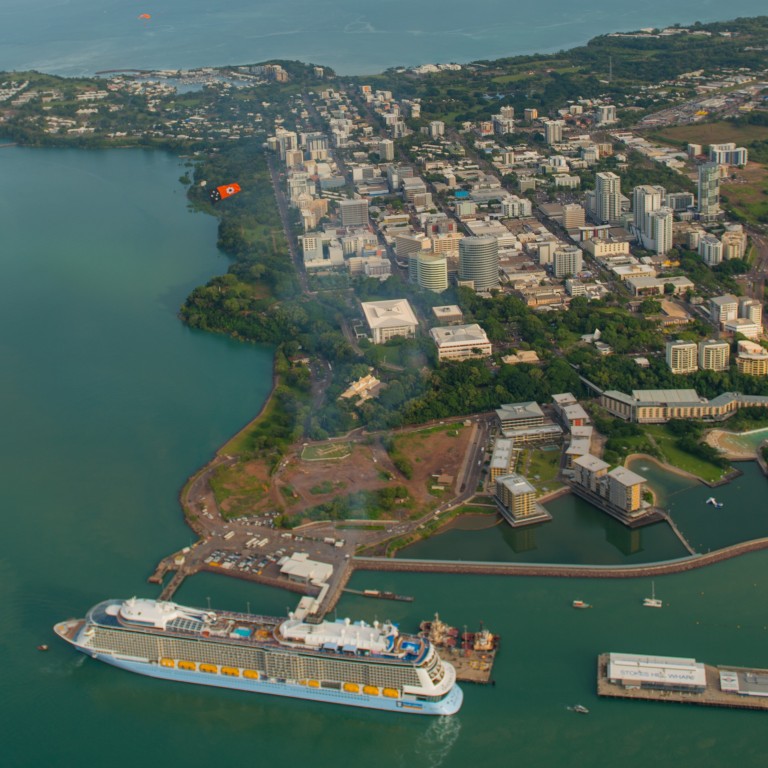
China-Australia relations: Landbridge vows to protect ‘legally binding’ Darwin Port deal if political pressure persists
- China’s Landbridge Group says Australia is sending the message that it does not want foreign investment, by threatening to tear up Darwin Port lease
- Australian politicians’ opposition to Landbridge’s 99-year lease grew out of Washington’s concerns over not being consulted before the deal was signed in 2015
In its first public comments since calls to axe the company’s 99-year lease of the port, Landbridge said at a press conference in Hong Kong on Wednesday that the port’s expansion had progressed in line with the contract struck in 2015, and that recent political comments made by Australian government officials had hurt its dealings with business partners.
“These political comments caused some problems for our business. We promote the use of Darwin Port to increase exports out of Australia, and for more business and trade with China and Southeast Asia,” Landbridge Infrastructure Holdings CEO Vincent Lai said.
“We have many trade partners and now, when we hold discussions with them, we field repeated questions on the status and the stability of our operations. So, yes, it affects our business.”
Landbridge also issued a statement saying the political comments by Dutton and other Australian politicians had not only hurt its business activities, they had also tarnished its international standing and reputation.
Shandong Landbridge Group will consider legal advice or other appropriate ways to protect its legal rights and interests
“It should be reminded that the 99-year lease agreement between the Northern Territory government of Australia and the Shandong Landbridge Group is legally binding,” the statement said. “The comments of relevant parties in Australia violate the basic spirit of the contract and the principle of mutual trust in business cooperation, and also seriously damage the legitimate rights and interests of Shandong Landbridge Group under the port lease agreement.
“Based on the further development of the issue, Shandong Landbridge Group will consider legal advice or other appropriate ways to protect its legal rights and interests.”
The comments came after Landbridge Australia managing director Mike Hughes said in an opinion piece published in the Australian Financial Review on the same day that he had never seen such mistreatment of an international company that had ticked all of the required regulatory boxes. In treating his employer this way, Australia is sending the message that it does not want foreign investment, Hughes warned.
“Having spent most of my career working for multinationals investing in different parts of the world – most of it for an American company in Southeast Asia – I have not seen a company as badly treated as Landbridge Group in Australia. For a country so heavily dependent on foreign investment, that is a worrying sign,” he said.
Even after the deal had cleared Australia’s own risk-assessment hurdles, including those on national security, politicians complained about the lease. In particular, they suggested the port would be a naval risk when, in reality, Australia would be able to take over the port under wartime conditions, should they occur.
This opposition grew out of Washington’s concerns over not being consulted before the signing of the deal in 2015.
Aside from being a commercial port, Darwin is also a base for Australian defence forces, as well as a contingent of US marines. But Landbridge is allowed to access only the commercial section of the port, and the company cannot invite naval visitations without government approval.
“To suggest that we would control naval vessels into Australian waters is risible,” Hughes said in his opinion piece.
The company also said that, in the past six years, the tonnage of ships docking at the port had increased, the port had been expanded to accommodate bigger vessels, and it now had three functional port areas supporting 300 jobs.
The increased exports passing through Darwin Port include a large portion of North Australia’s processed meat products and fish that are bound for China, while live cattle are sent to Indonesia and Vietnam via the port.
In the next 20 years, in line with the contract, Landbridge said it will construct more berths at the port to expand Australia’s exports, which should significantly boost operations.
Landbridge Infrastructure Holdings’ Lai said the company will continue to honour its commercial deal, noting that it was undertaken with a long-term view. But he also added that the company will continue to assess new risks, including political ones, and review how these could undermine its investment.

